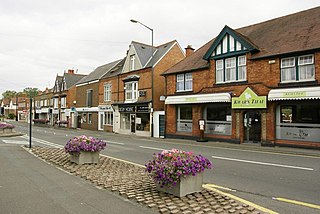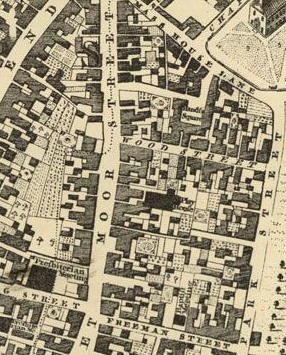Related Research Articles

The City of Birmingham Symphony Orchestra (CBSO) is a British orchestra based in Birmingham, England. It is the resident orchestra at Symphony Hall, Birmingham in Birmingham, which has been its principal performance venue since 1991. Its administrative and rehearsal base is at the nearby CBSO Centre, where it also presents chamber concerts by members of the orchestra and guest performers.
The folk music of England is a tradition-based music which has existed since the later medieval period. It is often contrasted with courtly, classical and later commercial music. Folk music traditionally was preserved and passed on orally within communities, but print and subsequently audio recordings have since become the primary means of transmission. The term is used to refer both to English traditional music and music composed or delivered in a traditional style.

Studley is a large village and civil parish in the Stratford-on-Avon district of Warwickshire, England. Situated on the western edge of Warwickshire near the border with Worcestershire, it is 3.5 miles (6 km) southeast of Redditch and 13 miles (21 km) northwest of Stratford-upon-Avon. The Roman road of Ryknild Street, now the A435, passes through the village on its eastern edge, parallel to the River Arrow. The name derives from the Old English leah, being a meadow or pasture, where horses, stod, are kept.
The Birmingham Symphony Orchestra was a professional symphony orchestra based in Birmingham, England between 1906 and 1918.

Thomas Appleby Matthews was an English conductor and organist.

Felix Adrian Norman Salmond was an English cellist and cello teacher who achieved success in the UK and the US.
The Beormingas were a tribe or clan in Anglo-Saxon England, whose territory possibly formed a regio or early administrative subdivision of the Kingdom of Mercia. The name literally means "Beorma's people" in Old English, and Beorma is likely to have been either the leader of the group during its settlement in Britain or a real or legendary tribal ancestor. The name of the tribe is recorded in the place name Birmingham, which means "home of the Beormingas".

The Theatre Royal, until 1807 the New Street Theatre, or, colloquially, New Theatre, was a 2000-seat theatre located on New Street in Birmingham, England. It was erected in 1774 and demolished in 1956.

The Moor Street Theatre was the first regular theatre – as distinct from earlier booths and converted barns for strolling players – to be established in Birmingham, England. Located in a back yard between Moor Street and Park Street north of the Bull Ring, it opened in 1740 with a performance of "Oratorio with Vocal and Instrumental Musick".
The Birmingham School of engravers emerged from the early Birmingham drawing academies of Joseph Barber and Samuel Lines in the early 19th century. By the 1850s and 1860s they were dominant figures in the art of line-engraving.
Holte Bridgman's Apollo Gardens were one of the main pleasure gardens of 18th century Birmingham, located on Moseley Street in Deritend, within the parish of Aston.
James Kempson was an English choirmaster, the founder of the Birmingham Musical and Amicable Society in 1762 and the Birmingham Triennial Music Festival in 1768.
The King Street Theatre was the first purpose-built theatre to open in Birmingham, England. The town had had earlier theatres, but the Theatre in Smallbrook Street, whose origins dated back to 1715, and Theatre in New Street, which was in an existence a few years later, were both makeshift structures; and the more substantial Moor Street Theatre, which opened in 1740, was a conversion of an existing building. King Street was a much more ambitious undertaking, being based on the examples of the established London patent theatres.
Classical music in Birmingham began in the late Middle Ages, mainly devotional music which did not survive the Reformation. Evidence is scant until the years following the Restoration of the Monarchy in 1660, when Birmingham's economy boomed. This was reflected in the scientific and cultural awakening known as the Midlands Enlightenment. The first sign of this transformation was the opening of the baroque St Philip's Church in 1715, which had a fine organ that attracted gifted musicians to the town.
St Stephen the Martyr's Church, Newtown Row is a former Church of England parish church in Birmingham.
George Halford's Orchestra was a professional symphony orchestra based in Birmingham, England from 1897 to 1907 and an important precursor of the later City of Birmingham Symphony Orchestra.
George John Halford was an English pianist, organist, composer and conductor.

William Stockley's Orchestra was a symphony orchestra based in Birmingham, England from 1856 to 1899. It was the first permanent orchestra formed of local musicians to be established in the town, in contrast to the earlier Birmingham Festival Orchestra, which consisted largely of outside musicians and only performed during the Birmingham Triennial Music Festival.

The New Birmingham Orchestra, sometimes called simply the Birmingham Orchestra, was a professional symphony orchestra established by Thomas Beecham and based in Birmingham, England between 1917 and 1919. Although it was short-lived, it was succeeded the year after its dissolution by what is now the City of Birmingham Symphony Orchestra, which was run in its early days by many of the same individuals.

William Cole Stockley was an English organist, choirmaster and conductor.
References
- ↑ Handford, Margaret (2006), Sounds Unlikely: Music in Birmingham, Studley: Brewin Books, p. 20, ISBN 1858582873
- ↑ Money, John (1977), Experience and identity: Birmingham and the West Midlands, 1760–1800, Manchester: Manchester University Press, pp. 85–86, ISBN 0719006724 , retrieved 2013-02-03
- ↑ Handford, Margaret (2006), Sounds Unlikely: Music in Birmingham, Studley: Brewin Books, p. 21, ISBN 1858582873
- ↑ Stephens, W. B. (1964), "Social History before 1815", in Stephens, W.B. (ed.), The City of Birmingham, The Victoria History Of The County Of Warwick, vol. VII, Oxford: Oxford University Press, pp. 209–222, retrieved 2013-02-03